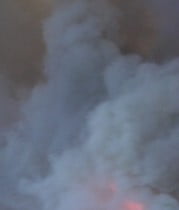
A study analyses gases released during incomplete combustion of three different cable types: one PVC-based sheath (poly vinyl chloride) and two PIN flame retarded (EVA/PE with/without cross linking, with c. 60% ATH flame retardant: ethyl vinyl acetate, polyethylene, aluminium tri hydroxide). Emissions from charring combustion between 600°C and 900°C were analysed using PCFC-FTIR (pyrolysis combustion flow calorimeter – Fourrier transform infrared). The PVC sheath cable results are presented in more detail, showing detection of gases including benzene and derivatives, naphthalene and derivatives, toluene, xylene, 2-ethyl hexanol and phthalic acid and its esters at temperatures 300°C to 600°C. The fraction of cable carbon content converted to partly oxidised gases (e.g. carbon monoxide, methane) is significantly lower at temperatures between 650°C and 800°C for the PIN FR cables (all cables show carbon conversion to nearly 100% CO2 above 800°C). The authors suggest that this could imply a higher risk of re-ignition for PVC cables in real fire conditions, which are often under-ventilated.
“Study of gases released under incomplete combustion using PCFC-FTIR”, A. Decimus, R. Sonnier, et al., J. Thermal Analysis and Calorimetry 2019 https://doi.org/10.1007/s10973-019-08160-5